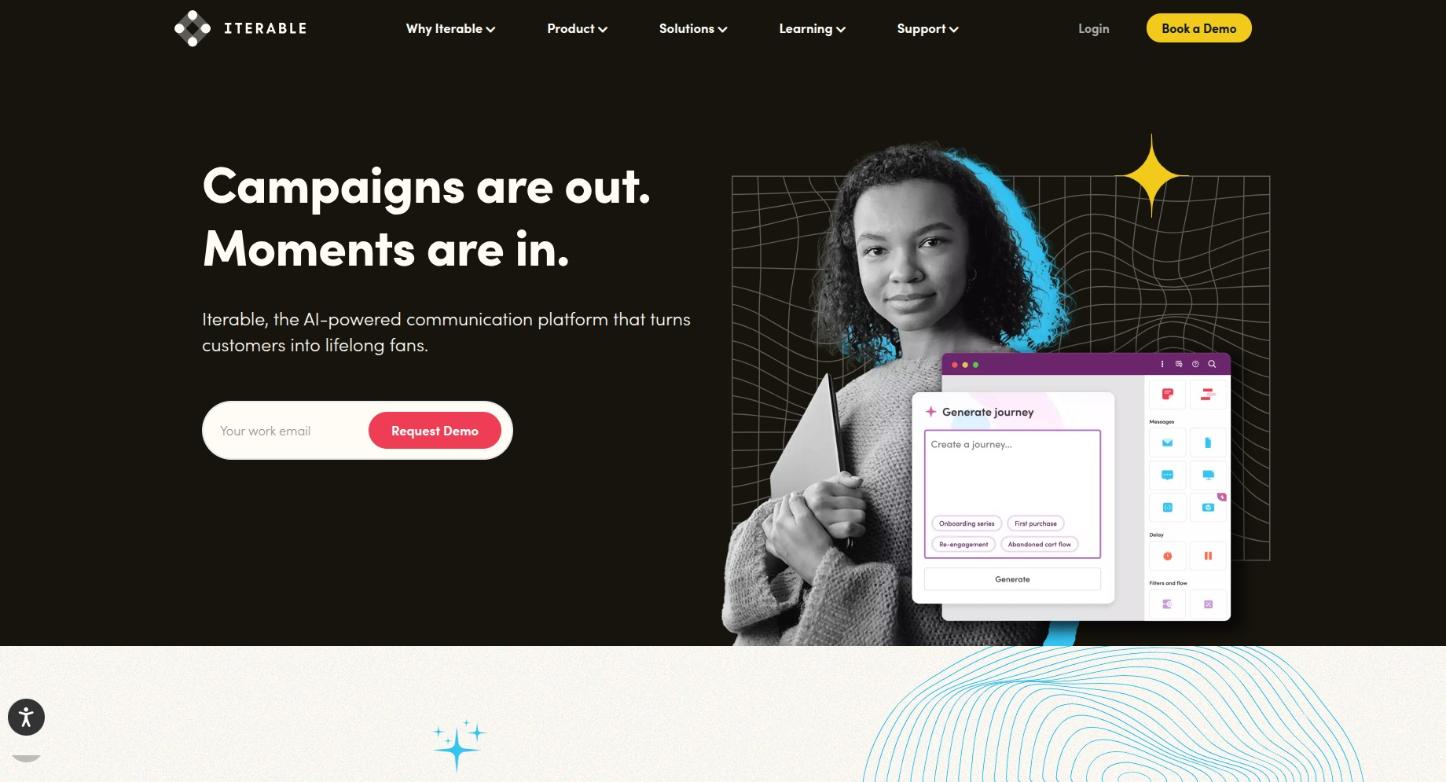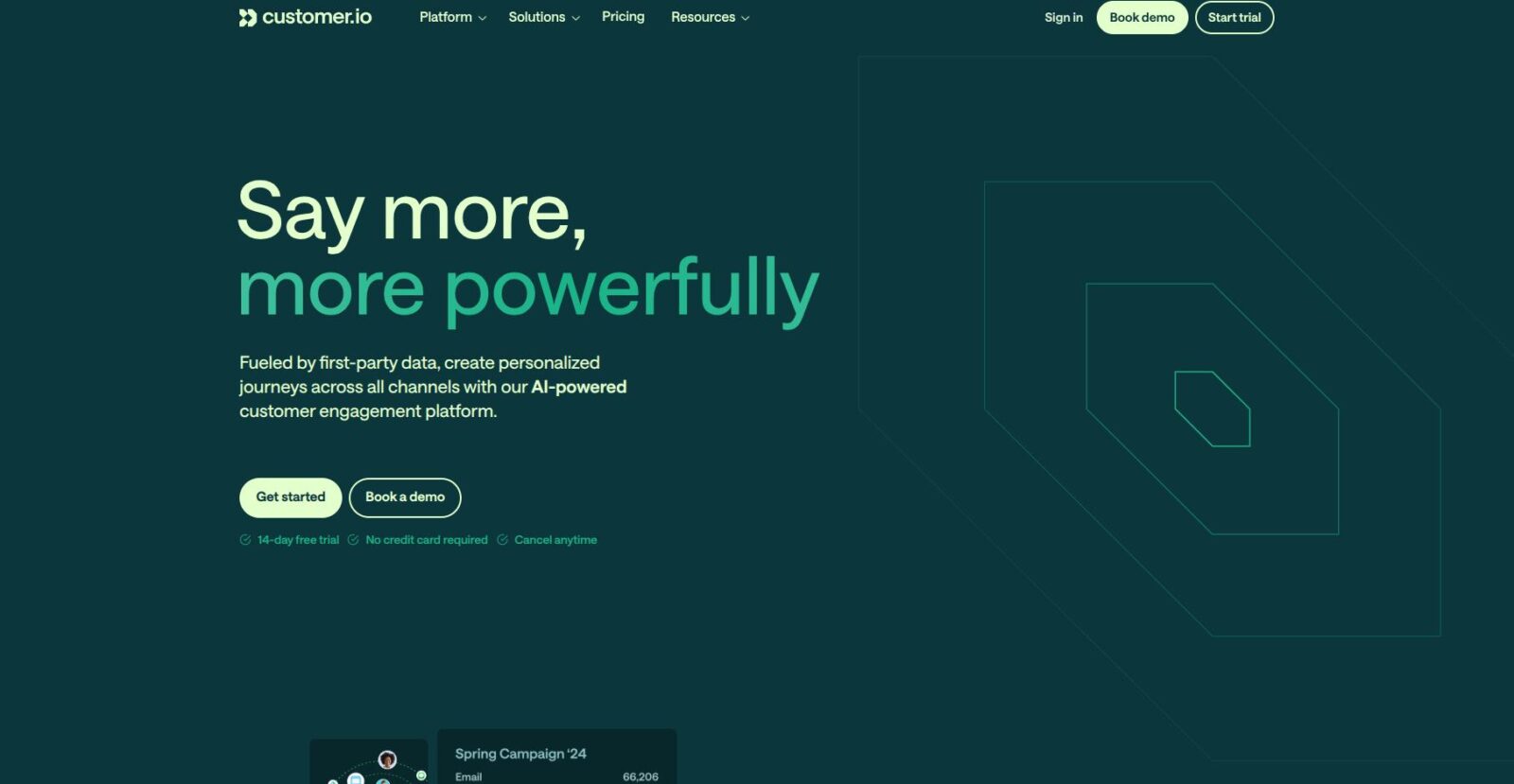Automation has changed how brands communicate — replacing generic outreach with intelligent, behavior-driven messaging that adapts to every customer’s journey. Two standout platforms lead this shift: Iterable and Customer.io. Both promise to simplify automated customer communication, yet they approach it differently. Iterable positions itself as a cross-channel communication platform powered by AI and personalization, while Customer.io brands itself around automation, data, and content creation.
Let’s see how these two automation giants perform across key areas — from workflow automation and data handling to personalization, pricing, and best-fit use cases — to help you choose the right tool for your business.
Overview of Platforms
Though their marketing language differs, Iterable and Customer.io share a common purpose — helping brands communicate automatically, contextually, and at scale.
Iterable aims to make cross-channel communication seamless, enabling marketing teams to orchestrate consistent experiences across email, SMS, in-app, and push.

Customer.io focuses on empowering teams to own their automation logic and data pipelines, giving developers and marketers equal flexibility.

Both platforms ultimately bridge the gap between data and communication — ensuring the right message reaches the right customer at the right time.
Automation Capabilities
Automation is the foundation of both platforms, though their philosophies differ.
- Iterable offers a visual, drag-and-drop workflow builder that simplifies campaign creation. Its AI engine helps optimize send times, select the best channel, and adapt sequences automatically based on user behavior.
- Customer.io, meanwhile, offers developer-grade workflow control, where every trigger, condition, and event can be customized. It’s ideal for technical marketing teams who want precise automation logic rather than pre-built templates.
Takeaway : Iterable wins for simplicity and speed; Customer.io wins for flexibility and control.
Data Handling and Integration
Data is the engine behind any automation platform. Both Iterable and Customer.io excel here, but in slightly different ways.
- Iterable provides strong integrations with CRMs, CDPs, and analytics platforms such as Salesforce, Segment, and Snowflake. It builds unified user profiles that allow marketers to launch personalized, predictive campaigns without needing deep data expertise.
- Customer.io shines with data transparency — giving teams the ability to push data directly from back-end systems via APIs or data warehouses. This is a major plus for SaaS and tech-heavy organizations that need full visibility and control.
Takeaway : Choose Customer.io for hands-on data management; Iterable for quick, plug-and-play integration with enterprise systems.
Personalization and Content Creation
This is where the two platforms’ identities become clear.
- Iterable relies on AI-driven personalization, automatically generating dynamic content blocks, predictive recommendations, and channel-optimized messages. It’s built for scale — ideal for teams managing thousands of segmented users.
- Customer.io emphasizes data-driven customization, allowing marketers to use Liquid templating and logic-based personalization. It gives advanced users deeper creative control over message content and structure.
Takeaway : Iterable for large-scale, AI-assisted campaigns; Customer.io for creative teams that love full message customization.
Channel Reach and Customer Experience
Both tools enable multi-channel communication, but Iterable takes a slightly broader approach.
- Iterable offers built-in support for email, SMS, push, in-app, and webhooks, creating seamless omnichannel flows. Its interface is designed for marketers who want unified communication without developer dependence.
- Customer.io provides the same channels, but setup often requires manual configuration or custom integrations. This makes it more suited to teams with engineering resources.
Takeaway : Iterable offers a smoother out-of-the-box omnichannel experience; Customer.io delivers deeper customization when you want to fine-tune every channel.
Pricing and Value Comparison
Pricing can be a deciding factor, especially for startups or scaling businesses.
- Iterable doesn’t publish public pricing; it’s typically quoted based on contact volume and features. It tends to be enterprise-grade, offering strong support and scalability for large marketing operations.
- Customer.io provides transparent, usage-based pricing, starting from affordable tiers and scaling with message volume and data complexity. It’s budget-friendly for smaller teams or product-led startups.
Takeaway : Iterable delivers enterprise power (but at a higher cost), while Customer.io provides accessible pricing for data-savvy teams.
Use Case Scenarios
Here are examples of how businesses typically use each platform:
- SaaS Product: A SaaS startup uses Customer.io to send lifecycle emails triggered by API events — onboarding, trial expiration, and churn prevention — all tied directly to its app database.
- E-commerce Brand: A retail brand leverages Iterable to deliver AI-based product recommendations, cart recovery messages, and post-purchase sequences across email and SMS.
- Fintech Company: A financial app combines Customer.io’s event data and Iterable’s multi-channel flexibility to personalize loan updates and push notifications.
Takeaway : Customer.io excels in technical, event-driven environments; Iterable dominates in scalable B2C and retail communication.
Integration Ecosystem
Both platforms play well with external tools, but in different ways:
- Iterable integrates effortlessly with marketing clouds, data warehouses, and analytics suites — perfect for teams already using Salesforce, Amplitude, or Looker.
- Customer.io provides robust API documentation and webhook support, letting developers tie it directly into home-grown or open-source data systems.
Takeaway : Iterable fits structured enterprise stacks; Customer.io suits flexible, API-first architectures.
Real-World Example
Imagine an online learning company with thousands of users signing up daily.
- Using Iterable, the marketing team can build an automated journey that welcomes new users via email, reminds them of unfinished lessons through push notifications, and sends milestone badges through in-app messages — all optimized by AI for timing and relevance.
- If the same company uses Customer.io, their technical team can connect student activity logs directly through APIs, customizing workflows so that messages are triggered based on exact user behaviors like quiz scores or subscription status.
Both achieve the same goal — automated communication — but the path differs depending on technical maturity and resources.
Feature comparison of Iterable vs Customer.io
| Feature | Iterable | Customer.io |
|---|---|---|
| Positioning | Cross-channel communication | Automation, data, and content creation |
| Ease of Use | Intuitive, AI-assisted | Technical, data-centric |
| Automation | Visual workflows with AI | Event-based, developer-controlled |
| Data Handling | Integrated and predictive | Transparent and API-driven |
| Personalization | AI-powered | Logic-based (Liquid templates) |
| Channel Support | Email, SMS, push, in-app | Same (manual setup) |
| Best For | Enterprise & retail brands | SaaS & data-driven teams |
Which Platform Fits Your Team Best?
- Choose Iterable if your goal is AI-powered, scalable automation that minimizes manual setup and offers seamless cross-channel coordination. It’s built for marketing teams that prioritize speed and unified communication.
- Choose Customer.io if you prefer data transparency, event-driven logic, and custom workflows. It’s ideal for product-led or SaaS companies where developers and marketers collaborate closely.
Both platforms elevate automated customer communication, but your choice depends on whether you want AI simplicity or data-level control.
Conclusion
The evolution of automated marketing has blurred the line between data orchestration and customer communication.
- Iterable represents the AI-first, marketer-friendly approach — perfect for scaling personalization across millions of users.
- Customer.io stands for flexibility and control — giving teams the freedom to mold automation around their data.
No matter which you choose, both platforms prove one truth — The future of customer engagement belongs to automation that speaks personally, acts intelligently, and adapts in real time.
